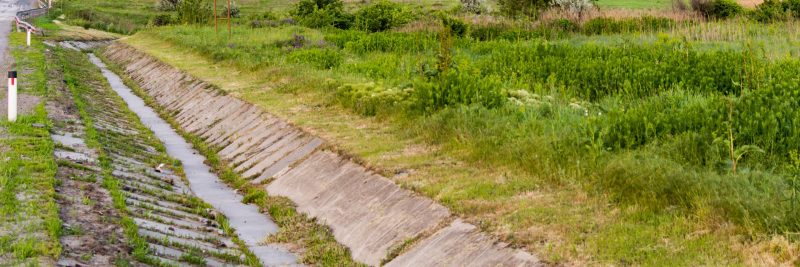Post by Evan Kirk, Project Director at the UNC EFC

In the Summer of 2021, the EFC identified more than $2.76 billion in stormwater capital needs in North Carolina over the next 15 years. Recognizing this need, the North Carolina Legislature earmarked $100.5 million in state fiscal recovery funds for stormwater capital and planning projects. While $18.5 million is allocated directly to specific local government units in the State Budget, the remaining $82 million will be awarded through a competitive application process. The state budget further dictates that construction grants will represent 70 percent of awarded funding, while planning grants represent 30 percent.
The State Budget also describes an eligible entity as a city or county that can specify a stormwater quality or quantity issue and that “demonstrates that it would experience a significant hardship raising the revenue necessary to finance stormwater management activities.” The North Carolina Department of Environmental Quality Division of Water Infrastructure (DWI) is responsible for administering the state fiscal recovery funds for stormwater and has developed the Draft Stormwater Administration Plan, which dictates how DWI will score and rank local government stormwater projects by answering the following questions1:
How will an entity demonstrate eligibility?
The Draft Administrative Plan says that an eligible entity is a city or county that meets one of the following criteria:
- Has a stormwater enterprise fund where expenses exceed revenues.
- Has at least two of the five Local Government Indicators that are worse than the state benchmark (population change, poverty rate, median household income, unemployment rate, per capita appraised value of the property). The state benchmark is the statewide median for each metric and is updated annually.
- Is implementing a project where 75 percent or more of the proposed project cost benefits a disadvantaged community (as defined by the NC DEQ Community Mapping System or otherwise demonstrated by the applicant).
How will project funding be prioritized?
NC DWI and SWIA held two stakeholder listening sessions to solicit feedback from stormwater stakeholders throughout North Carolina. Extensive internal work within DWI incorporating feedback from stakeholders, SWIA, and other state organizations lead to the Draft Stormwater Construction Grant Priority Rating System (PRS) and the Draft Stormwater Planning Grant PRS within the Draft Stormwater Administration Plan. These priority rating systems describe how projects will be evaluated and scored such that projects can be ranked relative to one another in order to prioritize funding to the highest scoring projects.
The Draft Stormwater Construction Grant PRS awards points for project characteristics in four categories: project purpose, project benefits, system management, and affordability. The Draft Stormwater Planning Grant PRS awards points for planning project characteristics in three categories: project benefits, system management, and affordability.
Public Comments
It is anticipated that the first round of funding will begin in the fall of 2022, with applications due by September 30. DWI is seeking public comment on the Draft ARPA Stormwater Administration Plan. Comments are due June 3, 2022, at 5:00 PM and can be emailed to dwi.publiccomments@ncdenr.gov with the subject line Comments on Division of Water Infrastructure Proposed Plan for Stormwater Funding. Please reference the press release for the public comment period for more information.
[1] DWI staff reviews all applications and scores them in accordance with the priority rating systems that are approved by SWIA. DWI staff then ranks the applications for each type of funding (ARPA, DWSRF, CWSRF, CDBG-I, State Drinking Water Reserve, State Wastewater Reserve, etc.) in the order of score from highest to lowest and prepares possible funding scenarios that are presented to SWIA. SWIA receives a spreadsheet of the ranked applications for each type of funding and the DWI staff funding scenarios for each type of funding. SWIA then makes funding decisions from the staff-prepared information.
Need technical assistance? The Environmental Finance Center is here to help!
The Environmental Finance Center at UNC-CH offers free one-on-one technical assistance for small water systems. If you have an interest in our support, fill out our interest form here or contact emkirk@sog.unc.edu.
Visit https://efc.sog.unc.edu/technical-assistance/ to read more about technical assistance.

